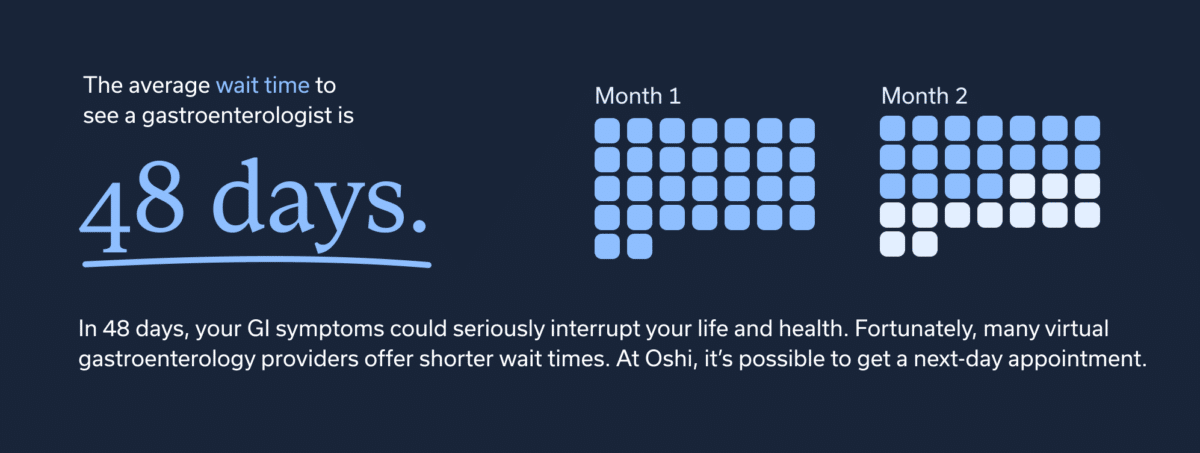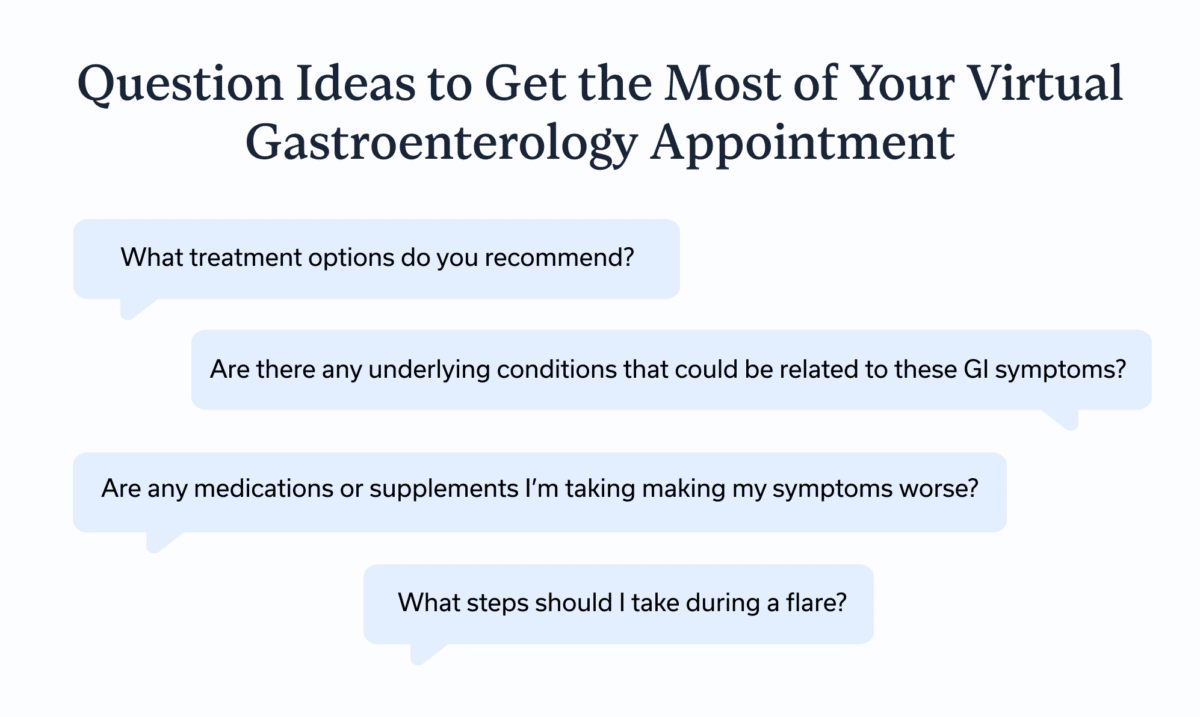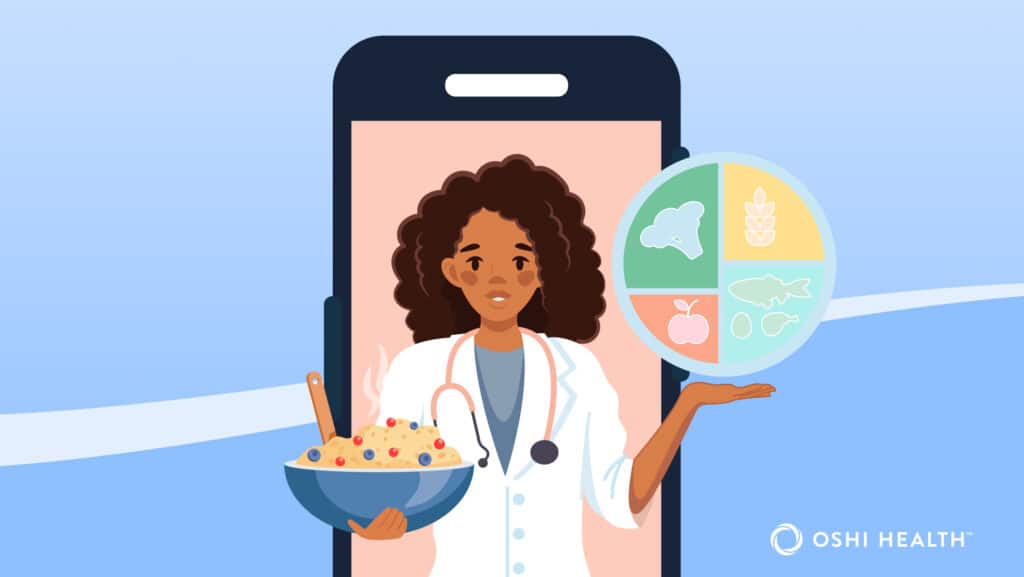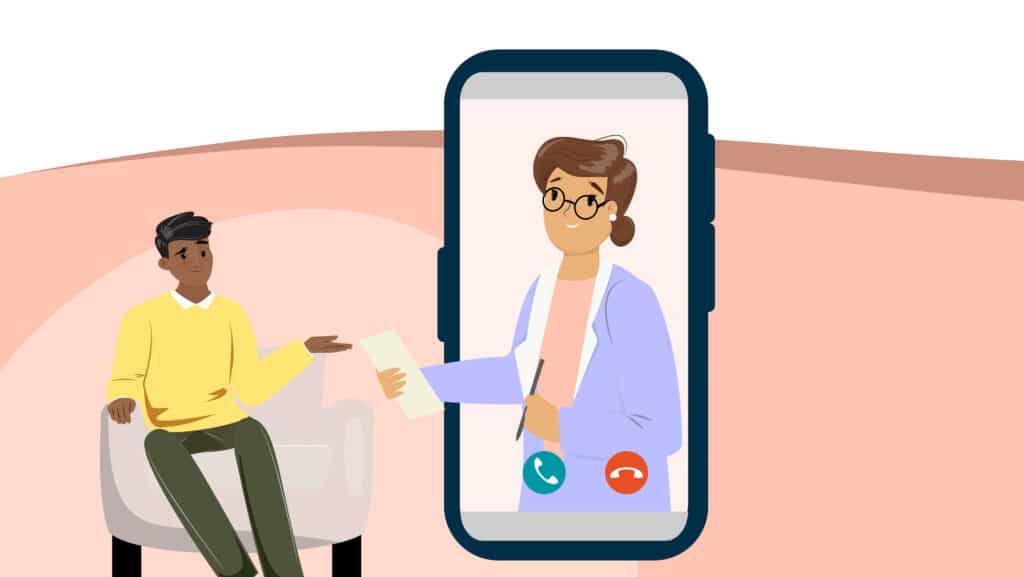Virtual gastroenterology care lets you see a healthcare provider with specialized gastrointestinal training—from the comfort of your home. But is virtual GI care effective? Yes. Most GI symptoms and conditions can be diagnosed and treated with virtual care, but some clinical tests and treatments may require a hybrid or in-person model.
Maybe it’s because I like to maximize my schedule, but there’s something very appealing to me about telemedicine. I’ve met with mental health therapists as well as my primary care provider virtually—and I have nothing but good things to say about the ease and quality of care. But while I’m a telehealth advocate, I admit I was skeptical at first about virtual gastroenterology consultations. For something as physical as GI symptoms, could a provider truly assess what’s going on when they couldn’t see or touch my stomach? After learning the truth about how remote diagnoses and treatments work for GI conditions, I’m a convert. Here’s why.
Understanding virtual gastroenterology care
Whether virtual or in-person, gastroenterology refers to specialized care for gastrointestinal (GI) symptoms and conditions. These conditions can have an impact on any part of your digestive system—which, overall, is made up of your gallbladder, esophagus, intestines, liver, pancreas, and stomach. And who exactly delivers this care? Sometimes, it’s a gastroenterologist, aka a medical doctor who has specific expertise, additional coursework and training, and plenty of experience treating these conditions. Plus, they’re board certified in gastroenterology. You may also see advanced practice providers, including nurse practitioners (NPs) and physician associates (PAs, also sometimes known as physician assistants) that specialize in gastroenterology as well.
There are a few reasons you may want to see a gastroenterologist or another GI provider. If you’re experiencing unexplained GI symptoms that are severe or ongoing or have an existing GI condition you’d like to better manage, a call to a gastroenterologist may be in order. Those who are at higher risk for stomach, colon, or pancreatic cancer should also see a GI provider.
Deciding if you need to see a GI provider should be the hard part. But for many, it’s just the beginning, because then, you’ll also need to find a provider to see. If where you live is anywhere like my town, finding a qualified (and local) specialist often involves a long waiting list and a half-hour commute to and from the office—and don’t get me started on how long it takes during rush hour.
An easier alternative? Booking a virtual gastroenterology consultation (commute and waiting list not required). GI telemedicine provides the same quality of care, and you meet with a qualified, experienced professional over a secure, HIPAA-compliant video conferencing software right from your own home.
Whole-person GI care—now available from almost anywhere
Oshi Health is where medical, dietary, and gut-brain treatments come together under one virtual roof, all provided by leading GI specialists. With virtual visits available within 72 hours—including evenings and weekends—we make it easy to see a GI provider within days.
How virtual gastroenterology consultations work
We can’t speak for all online gastroenterology practices, but here’s a rundown of how virtual consultations work at Oshi Health:
-
Schedule an appointment: Many local gastroenterologists have wait times of weeks or months before you can see them. Virtual GI providers can offer next-day appointments.
-
Initial virtual visit: During your initial visit, a GI provider will ask about your medical history, symptoms, and care goals. Oshi Health providers take the time to get to know you and your symptoms, meaning you are seen and heard throughout the appointment!
-
Develop a personalized care plan: During the initial appointment, your virtual GI provider will review your medical details and create a treatment plan customized to you. There’s a chance they’ll order additional tests (think lab work or imaging) to refine the care plan. If so, Oshi helps you find an in-network and convenient location, since these tests have to be completed in-person (unless someone invents the science of doing blood draws via video call). They may also refer you to an Oshi registered dietitian or gut brain specialist based on your needs.
-
Address the root cause: In follow-up sessions, you’ll work with your team of GI specialists to address the root cause of your symptoms from all angles (traditional gastroenterology, the gut-brain connection, dietary guidance, and more).
-
Ongoing support: GI conditions can be complicated—symptoms flare unexpectedly (and often at the worst possible times). Having a team of GI specialists whom you can reach virtually allows you to maintain symptom control, even after the initial treatment.
Insight into the benefits and limitations of virtual gastroenterology care
Before making a major life decision, I love a pros and cons list. And deciding what specialist to trust with your GI care is definitely a big decision! To help you decide if virtual gastroenterology is the right choice for you, we did some of the legwork and outlined the main pros and cons.

Advantages of virtual gastroenterology consultations
- Access leading gastroenterology providers: I’m fortunate enough to live near the Cleveland Clinic, which staffs many medical experts. But when I went to college in a small town, top experts were further away. If your geographical situation is similar, virtual care unlocks access to experienced specialists outside your zip code. Even if you do live near a leading healthcare system, more experts to choose from never hurts. Oshi Health, for example, has specific expertise in delivering GI telehealth, leveraging seasoned providers and a tech-enabled platform. Brick and mortar practices (and even academic centers) typically don’t have that level of expertise in delivering GI telehealth.
- Affordability: A 2023 study surveyed over 1,000 patients on the pros and cons of telehealth. Affordability came up time and time again as a major advantage. Alongside a lower cost for a virtual appointment, you can save on commute costs and not have to take time off work. Many virtual GI providers are in-network with private insurance plans. They may also offer flexible payment plans and accept HSA and FSA payments. Plus, virtual GI care has shown to reduce the number of ER visits—and no one mourns fewer ER bills.
- See a specialist faster: The average wait time to see a gastroenterologist is 48 days. In 48 days, your GI symptoms could seriously interrupt your life and health. Fortunately, many virtual gastroenterology providers offer shorter wait times. At Oshi, it’s possible to get a next-day appointment.
- Can be an addition to in-person care: Sometimes, virtual vs in-person care seems like an “either/or.” In reality, it can be an “and.” If you already have a local gastroenterologist you work with, or if you need in-person clinical tests and procedures, you can mix and match virtual gastroenterology consultations and local in-person components. Think of hybrid care as the workplace that offers free food on days you come into the office, but lets you pick which days to work remotely. It’s a win-win.
- Connect with a team of GI specialists: GI conditions don’t just have an impact on your gut. They can influence your mental health, overall health, and day-to-day life. They also aren’t straightforward to fix. Often, effective treatment involves care from a gastroenterology provider, dietary changes, stress management, and more. While many virtual providers enable easy access to a team of health care practitioners, Oshi Health is unique in its collaborative array of GI specialists offering virtual care—from GI registered dietitians to GI psychologists. Some local providers may offer this too, but it’s more rare—and means commuting to and from their office more often.
- More flexibility: Virtual gastroenterology consultations are available when you need them, including in the evenings and on weekends. With an in-person appointment, you may have to get a doctor’s note for work or (even worse) use PTO. Meanwhile, you can schedule virtual appointments around your work and life.
- No commute: The average distance traveled to a medical office is 17.93 miles. The commute can be even further for those who live in rural areas. With a virtual gastroenterology consultation, you get that commute time (and cost) back.
An integrated team of GI specialists, working together for you
Our expert gastroenterologists, GI providers, registered dietitians, and gut-brain specialists are leaders in their fields, with advanced education and training in gastroenterology. Our comprehensive team approach is personalized to meet your unique needs and address the root cause of your symptoms.
Limitations of virtual gastroenterology care
- Comfort level: This one could actually be a pro or con, depending on your preferences. Some people simply feel more comfortable during an in-person checkup. Others prefer virtual appointments. Talking about gut health (think diarrhea, burping, and farting) can be uncomfortable, but these discussions often feel less awkward when done from your preferred location, whether that’s a doctor’s office or at home.
- Insurance coverage: Your insurance coverage is probably as variable as your GI symptoms—and we can’t tell you whether your insurance provider covers gastro telehealth. We can, however, remind you to check insurance guidelines on virtual gastroenterology before booking an appointment. When booking, opt for a care provider (virtual or otherwise) who’s in-network with your insurance plan. Oshi Health, for example, is an in-network provider with many major health plans, like UnitedHealthcare, Aetna, Cigna, and more.
- Friction getting tests: There’s a common misconception that telehealth diagnoses are less accurate. While this is a myth, there can be extra friction in getting in-person diagnostic tests, like lab work, after a virtual appointment. In one study, 43% of clinical tests ordered in a virtual care appointment were completed on-time, compared to 58% for in-person appointments. To reduce this, look for a virtual GI provider like Oshi, who works with local labs and partners on all the IRL stuff.
- Not usually covered by Medicare: Starting January 1, 2025, Medicare is now limiting what telemedicine services it covers. There are exceptions for those who live in rural areas and for certain service types, mainly mental or behavioral care. But the TL;DR? Virtual GI care may not currently be the right fit for those with Medicare.
- Some services aren’t available virtually: This may go without saying, but surgeries and some clinical treatments aren’t available via virtual appointments. To overcome this limitation, Oshi has partnered with some of the largest in-person GI groups in the country to fast-track procedures when necessary.

What to expect during a virtual gastroenterology appointment
Once you’ve booked a virtual gastroenterology appointment, a link to join the virtual session—and instructions on how the online consultation works—should land in your inbox. Log in at the time of your appointment—or a few minutes early, if you’re like me and prefer to get your ducks in a row before the doctor logs on.
During the appointment, your gastroenterology provider will ask about your medical history, assess symptoms, and record a detailed account of your symptoms. A good GI provider will also take the time to understand your care goals and assess anything you’ve already tried to manage your symptoms.
Based on this appointment, your gastroenterology provider may or may not order additional clinical tests, including imaging or blood work. They’ll use all the information they’ve gleaned from your visit and any test results to diagnose your symptoms and make a treatment plan. Depending on your individual needs, they may recommend lifestyle changes, refer you to other types of GI specialists (i.e. a GI registered dietitian and/or gut-brain specialist), schedule a follow-up appointment, and/or prescribe medication.
What to discuss with your virtual gastroenterology provider
One of my biggest concerns is entering an appointment without knowing what to say. Maybe you can relate to the stress of not knowing what will happen in a health appointment—or worrying that you’ll forget to bring up something important.

To ease stress and get the most of your virtual gastroenterology appointment, here are some questions to ask your provider:
- Are there any underlying conditions that could be related to these GI symptoms?
- Are any medications or supplements I’m taking making my symptoms worse?
- Does my family history put me at risk for any gastrointestinal conditions?
- What are some signs of a flare or that the condition might be progressing?
- What steps should I take during a flare?
- What treatment options do you recommend?
- Are there any additional ways I can support my gut health?
- When should I seek emergency medical attention?
At the end of the appointment, double check that you’re clear on next steps, get clarity on how often you should see your GI provider, review how to book follow-up appointments, and ask how to stay in touch between visits.
Conditions that can be managed virtually in gastroenterology
If a gastroenterology provider can treat a GI condition in-person, they can likely do so virtually too. Common GI conditions for which you may want to seek remote care and support include:
- Acid reflux and GERD
- Crohn’s disease
- Irritable bowel syndrome (IBS)
- Small intestinal bacterial overgrowth (SIBO)
- Ulcerative colitis
Virtual gastroenterology is also a fantastic introductory option when you have GI symptoms, but aren’t sure what is causing them. Common GI symptoms include abdominal pain, bloating, nausea, constipation, and diarrhea.
Basically, when it comes to GI provider support and care, you can “go virtual” for any GI condition or symptom you can think of. What can’t be done virtually are some surgeries and procedures. A complication of ulcerative colitis, for example, is fulminant colitis, a severe flare-up marked by fever, abominable pain, and diarrhea. Should this happen, you may need surgical treatment.
You also shouldn’t turn to telehealth for emergencies. If you have Crohn’s disease, for example, you could experience potentially life-threatening complications, such as excessive bleeding or an intestinal obstruction (when something blocks the large or small intestine). Should any of these complications occur, call 911 or go to the ER.
The signs for immediate (in-person) care vary depending on the GI condition, but some general ones include:
- Diarrhea that won’t stop
- Dizziness or weakness, especially if ongoing
- Heavy anal or rectum bleeding
- High fever accompanied by severe GI symptoms
- Severe abdominal pain
- Severe chest pressure or pain
- Throwing up that does not stop
Conclusion
Virtual gastroenterology care is effective, convenient, and affordable. While I could go on and on about its benefits, here are the three main takeaways to keep in mind:
- Virtual gastroenterology is just as effective as in-person care. It involves meeting with a qualified professional in an online consultation room. Plus, it has unique advantages like shorter wait times and flexible scheduling. Some virtual providers even offer evening or weekend appointments. For many GI conditions, like functional issues, a virtual telehealth platform like Oshi might be even more effective because you have faster access to ancillary care—like a GI registered dietitian, for example.
- But virtual GI care also has drawbacks, such as some insurance gaps as well as treatments that are only available IRL. While a useful option to have, virtual GI care isn’t covered by Medicare, Medicaid (in many states), or even all private insurance providers. There are also certain clinical tests, surgeries, and treatments that cannot be completed virtually.
- It’s a personal decision. Once you’ve reflected on your own comfort level with virtual GI care and have determined it’s a good fit and financially feasible, it’s time to find the right virtual provider. Consider Oshi Health, whose team addresses GI symptoms and offers virtual appointments when you need them. If you’re ready find lasting relief, schedule your first appointment.
Frequently asked questions (FAQs)
-
Virtual gastroenterology is the same as traditional gastroenterology: It’s a specialized area of medicine that manages conditions and symptoms in the digestive system. The only difference is virtual appointments are conducted through a video conferencing software or an audio-only call. Virtual GI care provides many of the same benefits as in-person treatment, with added flexibility and shorter wait times.
-
Gastrologist and gastroenterologist are synonyms; both refer to a medical doctor trained in diagnosing and treating symptoms and conditions in the digestive system. The difference is that gastroenterologist is the term we use today, and gastrologist is an older term that’s not medically recognized.
-
Should a GI provider need to take a look at your stomach, they will either order imaging of the stomach (such as an MRI or CT scan) or will perform an upper endoscopy. This procedure involves inserting an endoscope (a long, flexible tube with a camera and light) into the upper GI tract to capture imagery and suss out any potential problems. If you’re seeing a virtual gastroenterology provider, they can’t look at your stomach from afar, but they can talk through symptoms and schedule a test with a local provider if needed.
-
A gastroenterologist is a medical doctor with specialized training in the digestive system. They can check your overall gut health, though most folks seek gastroenterology care due to unexplained GI symptoms that are ongoing and/or severe—or to help manage an already diagnosed GI condition. You may also benefit from a gastroenterology appointment if you’re at high risk for colon, pancreatic, or stomach cancer.
Oshi is your partner in digestive health
Feel like your digestive concerns are running your life? You’re not alone—and we’re here to help you find lasting relief.
Oshi Health GI providers, gut-brain specialists, and registered dietitians work together to address your symptoms and find solutions that actually work for you.
Whether you’re dealing with chronic digestive issues or unpredictable symptom flare-ups, our GI specialists deliver:
✔ Personalized care plans tailored to your lifestyle
✔ Science-backed strategies to calm your gut
✔ Compassionate, whole-person care
✔ And so much more!
Ready to take control of your gut health?










